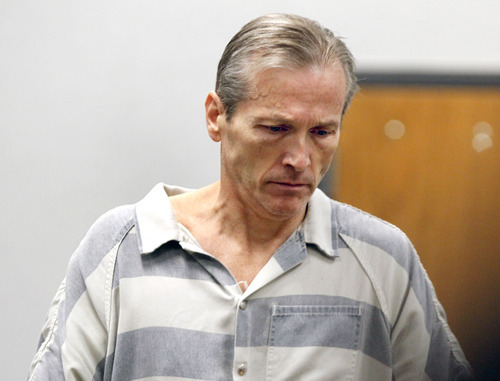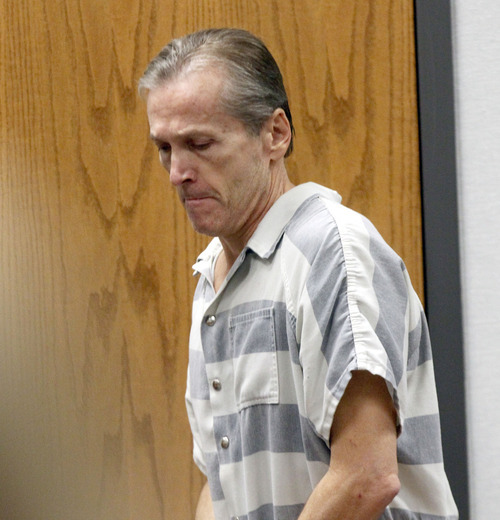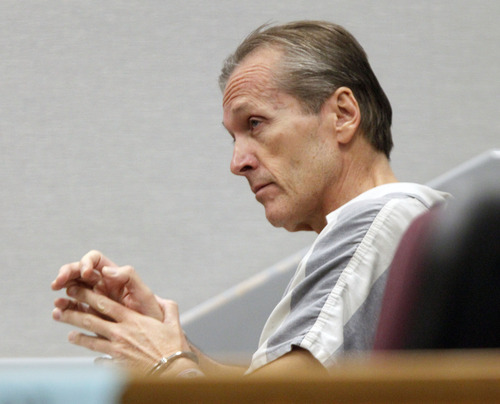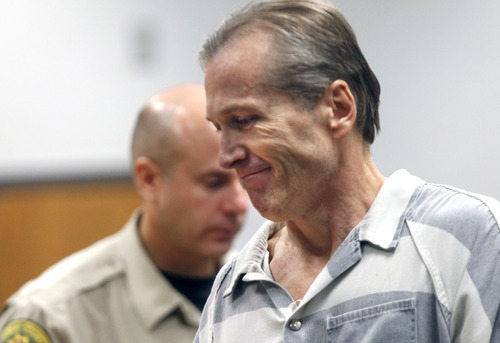This is an archived article that was published on sltrib.com in 2012, and information in the article may be outdated. It is provided only for personal research purposes and may not be reprinted.
Provo • Ada MacNeill's memory of her mother, Michele, is fuzzy.
The 11-year-old remembered her mother had blond hair and that she was pretty. She remembered the last time she saw her mother on April 11, 2007.
Though she can't remember friends she had at the time, or if her dad took her to McDonald's on the way home from school that day, she recalled running into her house after school and finding her mother in the bathtub, eyes open and not moving, but fully clothed in a blue jogging suit.
On Wednesday, she testified in 4th District Court that she went to get her father, Martin MacNeill, who had been sitting in the kitchen.
"I kind of just pulled him along," she said.
Ada's testimony came during the first day of a five-day preliminary hearing on charges that MacNeill, a 56-year-old Pleasant Grove doctor, killed his wife so he could be with another woman. MacNeill was having an affair with a woman named Gypsy Willis at the time of his wife's death, according to court documents, and allegedly devised a plan to kill his wife in order to continue the affair.
After the hearing ends next week, Judge Samuel McVey will decide if there is enough evidence to order MacNeill to stand trial on charges of first-degree felony murder and obstruction of justice, a second-degree felony.
MacNeill is accused of giving his 50-year-old wife a deadly mixture of prescription drugs after she came home to recover from cosmetic surgery in April 2007.
On that April day, MacNeill sent Ada to a neighbor's house for help and called 911. But in a recording played in court Wednesday, his words are nearly inaudible as he screamed at the dispatcher for help. He gave an incorrect address, and hung up on the dispatcher twice.
Kristi Daniels, the neighbor who Ada alerted for help, testified Wednesday that when she arrived at the MacNeill home, Michele MacNeill was wearing only a shirt. She said she performed chest compressions on the woman until medical officials arrived, while MacNeill performed mouth-to-mouth resuscitation.
Von Welch, a physician who works with Intermountain Healthcare in Spanish Fork, testified that he examined Michele MacNeill on March 29, 2007, in preparation for her surgery. The standard exam, required for clearance before surgery, revealed two things, Welch said: that Michele MacNeill had high blood pressure and she was depressed.
"She was a little bit difficult to engage," he testified. "She wasn't very talkative. She let Martin answer most of the questions for her. She seemed sad and stressed and couldn't really explain why."
Welch said he suggested that the woman postpone the surgery and attempt to get her blood pressure down to a more manageable level, but Martin MacNeill seemed insistent that the surgery move forward.
"He was a little bit anxious," Welch said. "There seemed to be an urgency to get the exam done."
Scott Thompson, the facial plastic surgeon who performed an upper, middle and lower facelift on Michele MacNeill, testified that the woman's surgery and recovery was routine.
At their initial meeting on March 22, 2007, Thompson said the couple seemed happy, and both seemed excited to go forward with the surgery. Thompson said Martin MacNeill did express some concern about his wife's ability to tolerate pain.
"Martin had said even from the very beginning she was extremely sensitive to pain and that she was a delicate person," he testified.
Thompson said he normally prescribes a combination of eye drops, an antibiotic, a steroid, a pain medication, anti-nausea drug and sleeping aids for patients. However, Martin MacNeill requested that in addition to the normal regimen, she be given a prescription of the painkiller Percocet and Valium, for anxiety.
"In this case, because of the fact that Martin was a physician, I was more willing to give more extra medications than I normally would have," Thompson testified.
Thompson said he was comfortable, but cautious, with the amount of drugs prescribed. He advised the couple, along with their daughter Alexis, that the pills should be taken one at a time, and never all together, because of their sedative effects.
The state medical examiner has never ruled Michele MacNeill's death a homicide. After an autopsy in 2007, her manner of death was ruled "natural," the result of "chronic hypertension and myocarditis, which are capable of causing acute unexpected arrhythmia and sudden death."
But investigators say Martin called the medical examiner multiple times and gave misleading information. In 2010, in a new investigative report, Chief Medical Examiner Todd Grey changed the cause of death to the combined effects of heart disease and drug toxicity. The manner of death was changed to "undetermined."
In recent years, other experts have also reviewed the case. A University of Utah professor of pharmacology and toxicology said he believed Michele MacNeill had taken a potentially lethal dose of medication. A medical examiner in Florida determined the immediate cause of death was drowning and that, contrary to the Utah medical examiner's findings, there was no evidence of acute or active myocarditis.
Twitter: @jm_miller











